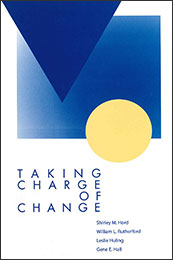Taking Charge of Change
Authors: Shirley M. Hord, William L. Rutherford, Leslie Huling-Austin, Gene E. Hall
| Product ID: CHA-22 | Price: $25.00 from Lulu.com |
Available online: PDF
![]()
If you are initiating school change, consider using the Concerns-Based Adoption Model (CBAM) as a guide through the process. And you'll find that Taking Charge of Change is the most readable introduction to this method of predicting teacher behavior during a change process.
Many school leaders and education researchers have turned to Taking Charge of Change when implementing a new program at a school. They find its lucid description of the CBAM provides concepts, tools, and techniques they can use to facilitate school change and improvement programs. As important, this book is written for working educators - whether they are in the school district central office or the principal's office or the classroom - who are responsible for leading a new program. Educators recognize their own school district in the fictional Springdale School District these authors invented to make CBAM concepts concrete.
Taking Charge of Change is a cornerstone in the school change literature for educators.
Many school leaders and education researchers have turned to Taking Charge of Change when implementing a new program at a school. They find its lucid description of the CBAM provides concepts, tools, and techniques they can use to facilitate school change and improvement programs. As important, this book is written for working educators - whether they are in the school district central office or the principal's office or the classroom - who are responsible for leading a new program. Educators recognize their own school district in the fictional Springdale School District these authors invented to make CBAM concepts concrete.
Taking Charge of Change is a cornerstone in the school change literature for educators.
About the CBAM
The CBAM is a conceptual framework that describes, explains, and predicts probable teacher behaviors in the change process. The three principal diagnostic dimensions of the CBAM are:- Stages of Concern — Seven different reactions that educators experience when they are implementing a new program
- Levels of Use — Behaviors educators develop as they become more familiar with and more skilled in using an innovation
- Innovation Configurations — Different ways in which teachers adapt innovations to their unique situations
Other CBAM Publications:
SEDL offers several publications so you can apply the CBAM when you introduce a new program, undertake research in a school setting, or launch an innovation in a school. The complete set of CBAM literature includes:- Taking Charge of Change - a readable introduction to the CBAM method.
- Measuring Implementation in Schools: The Concerns Based Adoption Model
- A Manual for Assessing Open-Ended Statements of Concern about an Innovation
- Measuring Change Facilitator Stages of Concern: A Manual for Use of the CFSoC Questionnaire
Professional Development on the CBAM Diagnostic Tools
The Center for High-Performing Schools at SEDL offers several professional development opportunities around Managing Implementation and Impact of Reform Initiatives.
Contact Information
For more information on the CBAM tools or to schedule a training session please send an e-mail to highperformingschools@sedl.org or call the Center's program manager, Dale Lewis at 512-391-6513.


